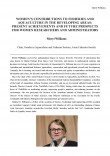Women’s contributions to fisheries and aquaculture in the developing areas: Present achievements and future prospects for women researchers and administrators

Women are slowly becoming recognised as the backbone of the fisheries and aquaculture sectors (Gopal et al. 2017). Researchers and women’s representative groups make the case that, from catch to consumer, gender matters and women must be empowered, counted and given voice in decision making (Williams et al. 2018). The case for gender is based on evidence that: the fish sector benefits when women’s contributions are valued; gender-blind policies and data undermine women’s contributions; and society and the environment benefit when women are empowered. In developing areas where most of the world’s fish is now produced, fisheries and aquaculture are undergoing major transitions that increase the challenges to gender equality, and also offer opportunities.
Women researchers and administrators have been at the forefront of gathering the evidence and making the case for gender sensitive policies and development interventions. Sometimes they have been joined and supported by their male colleagues, but frequently their gender work has been ignored, denied or even suppressed within their institutions. My own deeper interest in women and gender in fisheries came about through the initiatives of two of my male colleagues, Dr M.V. Gupta, and the late Prof M.C. Nandeesha. As women become more prominent in many societies, the future prospects for women researchers and administrators in fisheries seem brighter, but will depend ultimately on the directions taken by their societies and economies.
Many researchers promote the need for gender transformative change, but also realise that technology change and the political economy of fish production and trade, from local to global scale, also govern the possibility for transformative change. I will draw from over 40 years of experience as a woman working in mainstream fisheries and aquaculture research agencies in developing and developed regions, and bring together the big trends in the fish sectors and women’s roles and contributions, with a focus on the outlook for women researchers and administrators. My conclusions converge on those from recent political and public gender debates - that gender does not explain everything, nor does it explain nothing, but it does explain many of the future prospects for women researchers and administrators.
| Alternative title | 発展途上地域における女性研究者・管理者の養殖・水産業への貢献と今後の展望について |
|---|---|
| Date of issued | |
| Creator | Meryl Williams |
| Subject | Gender transformative change Political economy Women in fish value chains |
| Publisher | Japan International Research Center for Agricultural Sciences |
| Available Online | |
| NII resource type vocabulary | Conference Paper |
| Issue | 2018 |
| spage | 11 |
| epage | 15 |
| Language | eng |
